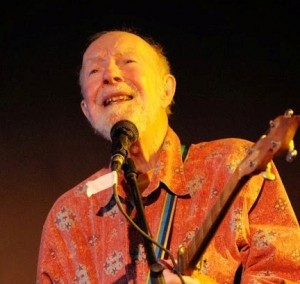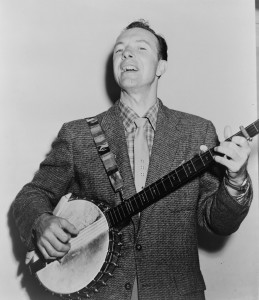Pete Seeger: Veteran of the Good Fight (1919-2014)

Pete Seeger at “Songs for the Cause,” an ALBA fundraiser held at the Museum of the City of New York in October 2010. Photo Len Tsou.
Pete Seeger, the most important progressive musician of his generation, and the most revered, died of natural causes on January 28. He was 94. At his 90th birthday celebration at a sold out Madison Square Garden in May 2009, he remained a vital and charismatic presence. Pete lived a long, almost epic life, and though it would be hard to say he went before his time, his passing still seems a surprise. Many thousands grew up with his exhortatory tenor voice and long neck banjo cajoling them to make a better world. For almost seven decades, progressives and folk music fans have depended upon his musicianship, honesty, inspiration, and courage.
Jon Pareles’s comprehensive obituary in the New York Times honors Pete’s many accomplishments, but doesn’t refer to his 60-year friendship with the Veterans of the Abraham Lincoln Brigade and the Abraham Lincoln Brigade Archives, and his long affiliation with songs of the Spanish Civil War. Seeger has performed at more events celebrating the volunteers’ activism and celebrating their history than any other performer. And it all began with his two passions: music and progressive politics.
“After the war was over I learned some of these songs from the returning Lincoln Vets,” he told an audience at NYU in the 1981. “I was 19, 20, 21 years old. I didn’t pronounce the Spanish right, but I was tremendously impressed by the heroism of the people that went to fight in Spain from different countries, the Internationalist spirit.” One such veteran was Bill Gresham. “He dropped round to Almanac house,” Pete recalled, referring to the home of a loose knit group of folk musicians, including Seeger and Woody Guthrie, famous for sending regular shots of adrenaline to the US Labor movement. “[Gresham] told me stories about Spain, and it might be that [it was] Bill Gresham who actually gave me the feeling for some of the songs.” Seeger taught the songs to the other Almanacs, “although they were dubious, even more dubious than I was, of being able to pronounce Spanish. Woody Guthrie used to call it ‘Viva La Kwincy Lada’ [‘Viva La Quince Brigada’]”. But the Almanacs did start performing some of the songs, “even though the war in Spain had been lost at least for the moment, but the fight against fascism was now worldwide.” That’s vintage Seeger—the war in Spain had only been lost “for the moment.”
In mastering this music, Seeger took advantage of another resource. Keynote Records tried to follow the success of their German 78s, Six Songs For Democracy, by recording a group of Spanish expatriate musicians in New York after the war ended in 1939. Seeger recalled those sessions in an interview: “They had a very good flamenco singer, guitar player, who’d left Spain when Franco took over and they had some singers, but they somehow weren’t able to get it all together, there was temperament here and misunderstandings there. However, I was present at some of the sessions when they were rehearsing.” He paid attention.
In 1944, when Moe Asch asked Pete to gather some musicians to record the 78s that would become the revered Songs of the Lincoln Battalion, he was prepared. That recording, re-released by Folkways in 1961, and soon to see another release on Smithsonian Folkways, remains in the collections of many a radical. “When I found out Moe was willing to record it, I probably wrote to the Lincoln vets and said, ‘Hey, send me all the words to these songs so I can do ‘em.’ He called Bess Lomax, Baldwin Hawes, and Tom Glazer (my father) and they joined the project, rehearsing on a Saturday, and taping on a Sunday while Seeger was on furlough from the US Army.
“As long as I live,” he said in 1981, “I may never make such a good recording.” The 1944 album was played through loudspeakers for 500 guests at the VALB reunion in New York City that same year. As reported in the Volunteer for Liberty: “Even Gabby Klein’s strident voice was hushed when everyone listened spellbound to the new recordings of the songs we sang in Spain.” Thirty-five years later, Seeger gave one of his many performances at a VALB event honoring black veterans. “To our pleasant surprise,” the Volunteer reported, “he brought with him two of the group which (sic) first recorded Songs of the Lincoln Brigade, so many years ago. . . . Before long he had a great sing-along going. Nostalgia took hold, and in that short spell we could feel the beauty and passion of Spain’s epic struggle for freedom.”
Pete Seeger never shied from epic struggles, and proved that music could help us see them through. His songs, spirit, and consummate artistry will always remind us of the beauty and passion that defined this remarkable man. Our memories of Pete will be with us when we need them the most.
Peter Glazer is a playwright, director, and Associate Professor of Theater, Dance, and Performance Studies at UC Berkeley. He interviewed Pete Seeger for his book Radical Nostalgia: Spanish Civil War Commemoration in America.














Thank you Peter. This is so good to see.
Thanks for this very interesting article. I am French, 64 years old, an admirator both of Pete Seeeger and The International Brigades.
I’m very found of The Volunteer. I live in Vaucluse,where fir-right is preeminent and I try, with others, to fight!
With my best regards,
Roger
It is a pleasure and privilege to respond to VALB’s tribute to “Pete
Seeger: Veteran of the Good Fight (1919-2014). I had the privilege
of not only being born a month or so before Pete, but also to have
shared in some of his earlier struggles on behalf of working people
and, particularly, in his support of the Good Fight. My earliest memory of Pete goes back to when he built puppets and provided them for an organization I co-led — Student Caravans for America –that toured the country with a message of peace during the so-called “phoney” war. During our show in Bristol, Vermont, Pete’s puppets and our stage were burned by a gang of vigilantes that then sought to do the same to us. We survived, and I had the honor of Pete attending
my 85th birthday celebration. I shall ever revere and honor him.
Henry Foner